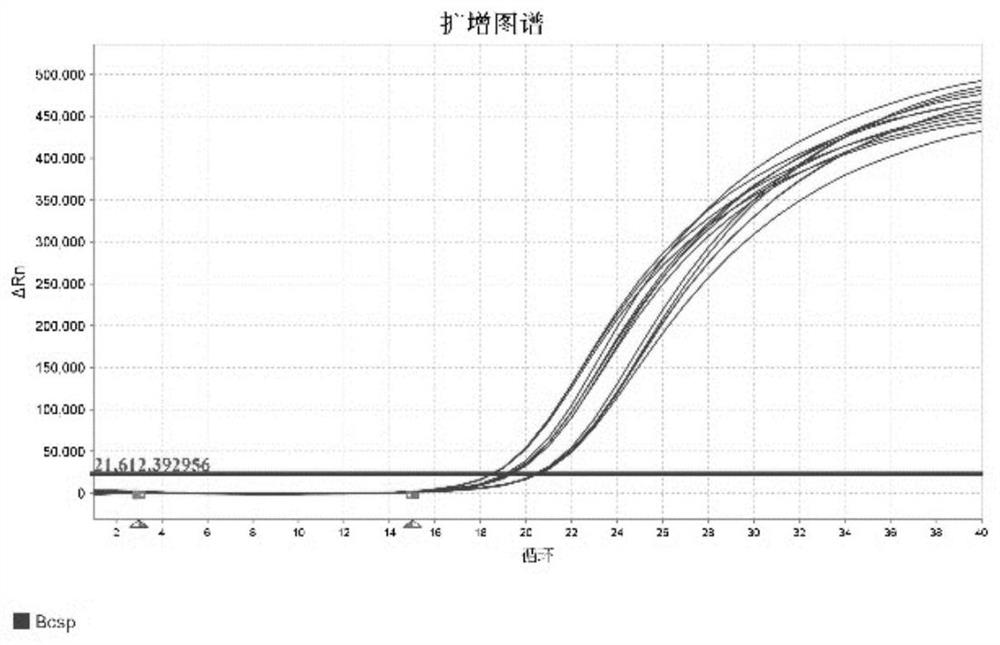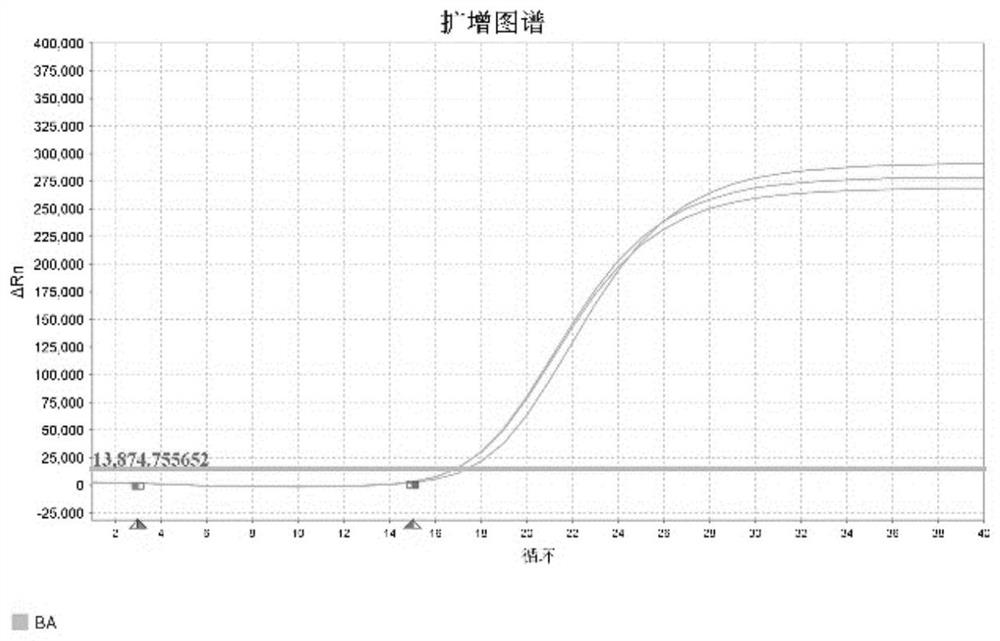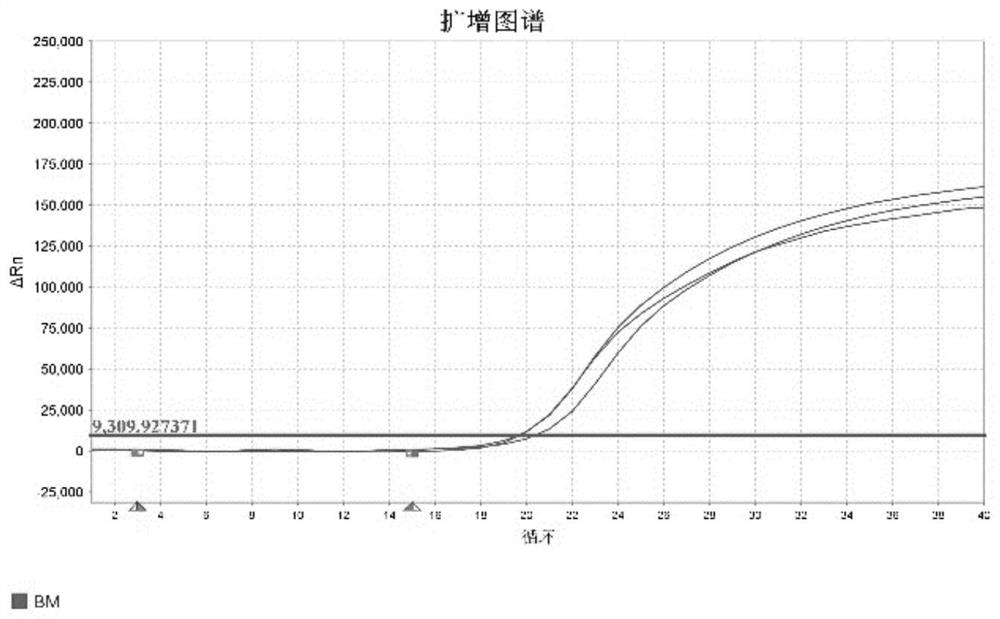Molecular marker capable of distinguishing Brucella abortus from Brucella melitensis and detection method
A technology of Brucella sheep and Brucella canis, applied in the field of pathogen molecular detection, can solve the problems of staff infection, limited promotion and application, time-consuming and laborious, etc.
- Summary
- Abstract
- Description
- Claims
- Application Information
AI Technical Summary
Problems solved by technology
Method used
Image
Examples
Embodiment 1
[0043] Example 1: Selection of Brucella-specific nucleic acid fragments and design of primers and probes
[0044] The Brucella 31kDa immunogenic protein gene Bcsp31 is a Brucella-specific gene that exists in all species of Brucella genomes and is highly conserved. The gene is located on Brucella chromosome I (817,132-818,121), with a total of 990 bases. Using AlleleID 6 software, a set of specific primers and Taqman probes for the above sequences were obtained, and the sequences amplified by the primers were:
[0045]CCGGAGCCTATAAGGACGTGGCGGAAACACCGACCCTTGCCGTTGCCGCACAGTGGGTGACGAGGCGCAAGCAGCCGGACGACCTCATCTATAACATCACCAAGGTTCTCTGGAACGAGGATACACGCAA (SEQ ID NO: 1)
[0046] Upstream primer: 5'-CCGGAGCCTATAAGGACGTG-3' (SEQ ID NO: 2);
[0047] Downstream primer: 5'-TTGCGTGTATCCTCGTTCCAG-3' (SEQ ID NO: 3);
[0048] Probe sequence: 5'-ACCGACCCTTGCCGTTGCCGC-3' (SEQ ID NO: 4);
[0049] According to the performance of real-time fluorescence quantitative PCR instrument, the fluorescent...
Embodiment 2
[0051] Embodiment 2: the selection of specific nucleic acid fragment of bovine species Brucella and the design of primer and probe
[0052] Since there are currently only reports of cattle, sheep, pig and canis Brucella in my country, according to the NCBI genome database (https: / / www.ncbi.nlm.nih.gov / genome) the cattle, sheep and The genome sequences of Brucella species, canine species and swine species were analyzed and compared, and a site that was highly conserved in the genome of Brucella bovis and missing in other species of Brucella was screened out. This site is located on chromosome II of Brucella bovis (B. abortus 2308 strain is an example: 157624-157704), and the sequence of its nucleotide fragment is as follows:
[0053] CAGTTCTCGAACAAGCTGACGGGCAGCGGCACGCTTGCTGTGTCGGGTTCTGGCACGCTGATCCTTTCGGCGGCCAATGATTATAG (SEQ ID NO: 5). The detection results show that the sequence exists in all Brucella bovis genomes, and the sequence homology with other species of Brucella is ve...
Embodiment 3
[0060] The selection of embodiment 3 Brucella sheep species specific nucleic acid fragment and primer, probe design
[0061] Similarly, through the sequence comparison analysis of the bovine, sheep, canine and suis Brucella genomes in the NCBI Brucella genome database, we screened out one that is highly conserved in the genome of Brucella sheep and is highly conserved in other species. deleted loci in the Brucella genome. This locus is located on chromosome 1 of Brucella melitensis (B.melitensis 16M strain is an example: 1209463-1209635), and the sequence of its nucleotide fragment is as follows:
[0062] AGCGAGATTGGAATAGCTTACCCGCCAATCTTCGCCCTGCCACCAGCCAATAACGGCAATTATCGCTGTCACTGTTGCAAGTATGGCAGCGAGCGCTCTAGCGTGACGAAGCACTGTCTTTCTGACAATTTCCAGATTCACCCCTAGGGCGTGTCTGCATTCAACGTAACCAG (SEQ ID NO: 9). This sequence is imported into the NCBI website and retrieved with the Blast function, and this sequence all exists in all Brucella sheep genomes, and the genome sequence homology with ot...
PUM
 Login to View More
Login to View More Abstract
Description
Claims
Application Information
 Login to View More
Login to View More - R&D
- Intellectual Property
- Life Sciences
- Materials
- Tech Scout
- Unparalleled Data Quality
- Higher Quality Content
- 60% Fewer Hallucinations
Browse by: Latest US Patents, China's latest patents, Technical Efficacy Thesaurus, Application Domain, Technology Topic, Popular Technical Reports.
© 2025 PatSnap. All rights reserved.Legal|Privacy policy|Modern Slavery Act Transparency Statement|Sitemap|About US| Contact US: help@patsnap.com



